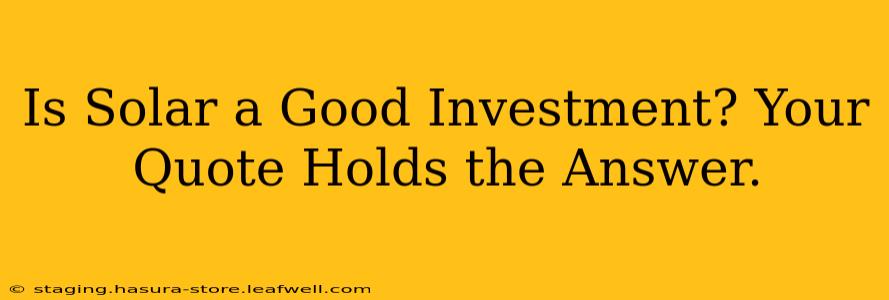Is Solar a Good Investment? Your Quote Holds the Answer.
Going solar is a big decision, one that requires careful consideration of upfront costs, long-term savings, and environmental impact. But the question on many homeowners' minds boils down to a simple one: is it a good investment? The answer, as we'll explore, isn't a simple yes or no, but rather depends on a variety of factors unique to your situation. Your individual circumstances, coupled with a thorough cost-benefit analysis, will ultimately hold the key.
This article will delve into the multifaceted aspects of solar panel investment, helping you understand whether it's the right choice for you. We'll tackle the frequently asked questions surrounding solar energy investment to provide you with a comprehensive understanding of this increasingly popular energy solution.
What are the upfront costs of installing solar panels?
The initial investment in solar panels can seem daunting. Costs vary greatly depending on several factors:
- System size: The more panels you need to cover your energy consumption, the higher the upfront cost. A larger home or one with high energy usage will require a more extensive and expensive system.
- Panel type: Different panel technologies (monocrystalline, polycrystalline, thin-film) offer varying levels of efficiency and cost. Higher-efficiency panels usually come with a higher price tag.
- Installation costs: Labor costs, permitting fees, and other installation-related expenses contribute significantly to the overall project cost. These costs can vary geographically.
- Incentives and rebates: Government incentives, tax credits, and rebates can dramatically reduce the upfront cost. It's crucial to research available programs in your area.
It's important to obtain multiple quotes from reputable solar installers to compare pricing and understand the breakdown of costs. While the upfront investment can be substantial, it's crucial to consider this alongside the long-term savings and potential resale value increase.
How long does it take to recoup the investment in solar panels?
The payback period for solar panel investment is a key consideration. This is the amount of time it takes for the energy savings generated by your solar panels to offset the initial investment cost. The payback period varies significantly based on:
- Electricity rates: Higher electricity prices lead to faster payback periods.
- System size and efficiency: A larger, more efficient system will generate more energy and reduce the payback period.
- Solar irradiance: Areas with high levels of sunshine will experience faster payback periods.
- Incentives and rebates: Significant government support can drastically shorten the payback period.
On average, the payback period for solar panel systems ranges from 7 to 10 years, but this can be shorter or longer depending on the factors mentioned above. A detailed financial analysis considering your specific circumstances is essential to accurately determine your payback period.
How do solar panels affect the value of a home?
Numerous studies show that homes with solar panels tend to sell faster and for a higher price than comparable homes without solar. Potential buyers often view solar panels as a desirable feature, increasing the property's attractiveness and value. The increased value can partially offset the initial investment cost. The extent of this value increase depends on the market, the size and quality of the solar system, and the overall condition of the home.
Are solar panels worth the investment in the long run?
The long-term value proposition of solar panels is strong. Beyond the financial benefits of lower electricity bills and potential resale value increase, there are significant environmental advantages. Solar energy is a clean, renewable energy source, contributing to a reduction in carbon emissions and a cleaner environment. This long-term environmental benefit is a significant factor for many homeowners considering solar.
Ultimately, whether solar panels are a "good" investment depends on your specific circumstances, financial situation, and long-term goals. A comprehensive analysis of upfront costs, potential savings, and available incentives is vital before making a decision. Consult with reputable solar installers and financial advisors to receive personalized guidance and accurately assess the feasibility and return on investment for your situation. Don't let the initial investment scare you – consider the long-term benefits, both financial and environmental, to make an informed decision that aligns with your individual needs.

